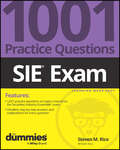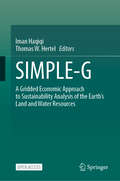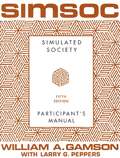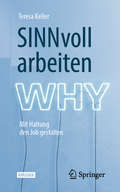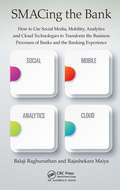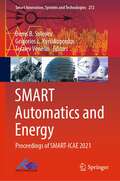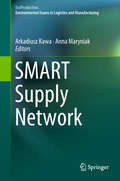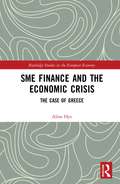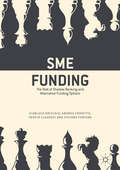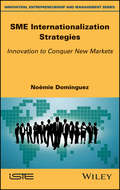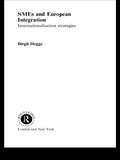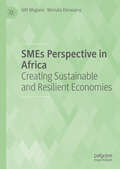- Table View
- List View
SIE Exam: 1001 Practice Questions For Dummies
by Steven M. RiceA helpful and effective SIE test prep resource If you want a job in the Securities industry, the first step is to show your employer you’ve got what it takes. And to do that, you need a great score on the SIE Exam. You can maximize your chances of acing it on the first try with the latest SIE practice resource from your friends at For Dummies. SIE Exam: 1001 Practice Questions For Dummies offers helpful and challenging practice questions, along with detailed, step-by-step answers and explanations, for anyone preparing for the Securities Industry Essentials exam. This useful study aid will help you banish test anxiety and get familiar with the format of the test questions. It also provides: Questions for every domain on the SIE exam Fully explained answers for every question so you can see where you went wrong (or right!) on each one The perfect companion for everyone preparing for the Securities Industry Essentials exam, SIE Exam: 1001 Practice Questions For Dummies is a fast, efficient, and effective way to prep for the test.
SIMPLE-G: A Gridded Economic Approach to Sustainability Analysis of the Earth’s Land and Water Resources
by Thomas W. Hertel Iman HaqiqiThis is an open access book. Crafted for both the economist and the curious mind, this book introduces a novel approach to blending economic and biophysical sciences to enable multi-scale analysis of a range of sustainability challenges confronting the world’s land and water resources at both local and global scales. It focuses specifically on the interface between the environment and food systems, utilizing economic theory to structure the overall framework. However, within the SIMPLE-G framework, there is ample room to incorporate fine-scale biophysical knowledge from agronomy, climate science, ecology, geography, hydrology, as well as a range of socioeconomic considerations. This enables multi-scale analyses incorporating grid cells that can vary in size from 250 meters to sub-regional scales. This, in turn, allows for investigation of global change drivers’ impacts on local sustainability, as well as feedbacks from local sustainability policies to regional and global outcomes. The book opens with a foreword by a prominent sustainability scientist, Prof. Navin Ramankutty, and proceeds in five parts covering, respectively: (1) introduction and overview, (2) basic economic theory underpinning SIMPLE-G, (3) the SIMPLE-G framework, including structure, data, parameters, computer implementation, and validation, (4) eight diverse applications of the SIMPLE-G framework, covering a range of geographies and sustainability challenges, and (5) a forward-looking chapter on future directions. The book provides step-by-step guidance on building and utilizing gridded models with real-world case studies demonstrating practical applications which will facilitate its use by academics, practitioners, and students conducting research on climate impacts, land-use, water resource management, food security, poverty, equity, nutritional outcomes, and overall sustainability.
SIMSOC: Fifth Edition (Participant's Manual)
by William A. Gamson Larry G. PeppersThe official guide to SIMSOC, the dynamic group simulation game whose "potential for stimulating the learning process is staggering" (Teaching Sociology), in which players grapple with the challenge of governing society.In SIMSOC, players confront issues like abuse of power, justice, diversity, trust, and leadership as they negotiate their way through labor-management strife, political turmoil, and natural disasters. Success or failure is dependent upon decisions made by players and the creativity of the group--and every game is a teaching tool. To be successful, players must utilize every basic social process from cooperation and reward to threat and punishment. SIMSOC will make participants ask questions about social control, and bring everyday experience and deeper understanding to even the most arcane social and organizational theory. Included in this Fifth Edition of SIMSOC's Participant's Manual are instructions for playing, materials for play, study questions based on participation, and selected readings about simulation games, leadership, and social processes. New to the Fifth Edition are additional size levels to accommodate groups of up to ninety participants with simplified rules and readings by authors from Nicholas Lemann to Robert Putnam.
SIMSOC: Simulated Society, Participant's Manual
by William A. Gamson Larry G. PeppersSIMSOC: Participant's Manual SIMSOC (which is pronounced sim-sock and stands for simulated society) is a dynamic group simulation game that forces participants to cope with the daily problems of governing society. Assuming a variety of roles, the players grapple with issues like abuse of power, justice, diversity, trust, and leadership as they negotiate their way through labor-management strife, political turmoil, and natural disasters. SIMSOC imposes few rules and restrictions upon its participants. There is no programmed outcome. Success or failure is dependent upon decisions made by players and the creativity of the group. To be successful, players must utilize every basic social process from cooperation and reward to threat and punishment. SIMSOC will make participants ask questions about social control, and bring everyday experience and deeper understanding to even the most arcane social and organizational theory. Included in this Fifth Edition of SIMSOC's Participant's Manual are instructions for playing, materials for play, study questions based on participation, and selected readings about simulation games, leadership, and social processes. New to the Fifth Edition are additional size levels to accommodate larger groups, simplified rules, and readings by authors from Nicholas Lemann to Robert Putnam. Each SIMSOC participant should have a copy of the Participant's Manual and the instructor a copy of SIMSOC's Coordinator's Manual, which contains additional materials needed for play and directions on how to set up and run SIMSOC. One Coordinator's Manual will be needed for each SIMSOC exercise of up to ninety participants. It can be obtained, for a $5.00 fee, by writing, on letterhead, to: The Free Press A Division of Simon & Schuster, Inc. Faculty Service Desk 1230 Avenue of the Americas New York, NY 10020
SIN Capital and the Fullerton Health IPO
by Josh Lerner Ann LeamonIn early 2016, David Sin, founder of the Singapore-based private equity group SIN Capital and chairman of its primary holding, Fullerton Health, was deeply involved in preparations for taking Fullerton public on the Singapore stock exchange. Three years after SIN Capital had invested in Fullerton, a provider of enterprise health management, and two years ahead of the original plan, it had attained a valuation of over S$1 billion. Listing the company would provide a number of important benefits as the management team and the investors expanded the operation throughout South Asia. This case describes the benefits and drawbacks of Fullerton's planned IPO, along with the strategy that had propelled its impressive growth. It also presents David Sin's vision for SIN Capital as a different type of private equity firm.
SINNvoll arbeiten: Mit Haltung den Job gestalten
by Teresa KellerWer kennt es nicht, Veränderungsdruck, Zeitknappheit und das Gefühl nur noch zu reagieren und nicht mehr zu agieren?Dieser Ratgeber zeigt auf, wie man Zeiten, in denen alles komplexer, schneller und unbeständiger wird, mit Integrität begegnen kann. So können Sie Haltung bewahren und im Wandel Stabilität generieren. Damit gelingt es Ihnen, sich und Ihr Umfeld positiv zu gestalten und nachhaltig maßgebliche Erfolge zu erzielen.Mehr noch, dieses Buch führt Sie zu einer konstruktiven Reflexion mit sich selbst. Es bietet durch fünf Grundpfeiler des integren Verhaltens eine hilfreiche Struktur zur persönlichen Weiterentwicklung. Sie gewinnen Standhaftigkeit und bleiben bei sich selbst, was Ihnen auch die Toleranz anderen gegenüber ermöglicht. Erfahren Sie, wie Sie in Veränderungsprozessen die häufig auftretenden Sinnkrisen durch Haltung, Orientierung und Integrität minimieren und in Erfolg transferieren können. Zielgruppen: Alle, die sich in bewegten Zeiten mehr Orientierung wünschenBerufstätige, die in ihrer Arbeit gerne wirksamer sein wollenFach- und Führungskräfte, Unternehmerinnen und UnternehmerVerantwortliche im Bereich Personal-, Organisations – und TeamentwicklungBerater und Coaches Zur Autorin: Dr. Teresa Keller ist seit 2008 ist sie als Beraterin, zertifizierter Coach und Buchautorin tätig und arbeitet an Themen wie Implementierung von Integritätsmanagement, Teamentwicklung, Konfliktmediation und strategische Ausrichtung. Sie ist Dozentin für die Themen Teamentwicklung und Führung in Unternehmen. 2013 gründete sie das Flourishing Institut.
SIPEF: Biological Assets at Fair Value under IAS 41
by Edward J. Riedl Kristin MeyerThis case examines fair value accounting under lAS 41 for a European-listed agricultural firm. Students identify the firm's core operations, distinguishing the IFRS treatment for three distinct assets: land; agricultural assets that reside on the land; and inventory harvested from the land. They also analyze key reporting decisions relating to the agricultural assets, which create frictions such that market value and book value do not converge despite the application of fair value for the majority of the firm's assets. The case also highlights how fair value accounting affects key valuation inputs such as earnings, and the implications for abnormal-earnings based valuation.
SKA (Sweden)
by David F. HawkinsManagement is debating a proposal to capitalize R&D. While Swedish GAAP permits capitalization, the general practice is to expense R&D as incurred.
SKS Microfinance
by Shawn Cole Theresa ChenVikram Akula, CEO of SKS Microfinance, seeks a venture capital investment to fund his firm. SKS, one of the largest and fastest growing microfinance institutions in India, is a profitable, for profit institution with a social mission. In what is one of the first commercial financing deals in the world, Akula must decide at what value to sell equity in SKS, and to whom to sell it. The case focuses on valuation, which is difficult because at the time there are no publicly traded comparable companies, and the strategic aspects of raising money.
SKS Microfinance (Abridged)
by Shawn Cole Theresa ChenVikram Akula, CEO of SKS Microfinance, seeks a venture capital investment to fund his firm. SKS, one of the largest and fastest growing microfinance institutions in India, is a profitable, for-profit institution with a social mission. In what is one of the first commercial financing deals in the world, Akula must decide at what value to sell equity in SKS, and to whom to sell it. The case focuses on valuation, which is difficult because at the time there are no publicly traded comparable companies, and the strategic aspects of raising money.
SKS and the AP Microfinance Crisis
by Shawn Cole Yannick SalemanSKS, India's leading microfinance firm, is challenged when politicians declaim microfinance as exploitation of the poor and severely restrict business practices.
SMA: Micro-Electronic Products Division (A)
by Michael Beer Michael L. TushmanThe Micro-Electronic Products Division of SMA has financial and organizational problems. Conflict and lack of coordination exist between functional groups. Employees do not have a sense of direction and morale is low. The cause of these problems is found in a change in business environment followed by change in organization and management. A rewritten version of an earlier case.
SMA: Micro-Electronic Products Division (A)
by Michael Beer Michael L. TushmanThe Micro-Electronic Products Division of SMA has financial and organizational problems. Conflict and lack of coordination exist between functional groups. Employees do not have a sense of direction and morale is low. The cause of these problems is found in a change in business environment followed by change in organization and management. A rewritten version of an earlier case.
SMA: Micro-Electronic Products Division (B)
by Michael Beer Michael L. TushmanFocuses on the recommendations and implementation strategy suggested by the organizational development group for the division's problems. A rewritten version of an earlier case.
SMA: Micro-Electronic Products Division (B)
by Michael Beer Michael L. TushmanFocuses on the recommendations and implementation strategy suggested by the organizational development group for the division's problems. A rewritten version of an earlier case.
SMA: Micro-Electronic Products Division (C)
by Michael Beer Michael L. TushmanSupplements the (B) case. A rewritten version of an earlier supplement.
SMA: Micro-Electronic Products Division (C)
by Michael Beer Michael L. TushmanSupplements the (B) case. A rewritten version of an earlier supplement.
SMACing the Bank: How to Use Social Media, Mobility, Analytics and Cloud Technologies to Transform the Business Processes of Banks and the Banking Experience
by Balaji Raghunathan Rajashekara MaiyaThe formula for the Future of Work is called SMAC - social, mobile, analytics and cloud on one integrated stack where each function enables another to maximize its effect. This is the new enterprise IT model delivering an organization that is more connective, collaborative, real time and productive. This book provides a comprehensive view of how SMAC Technologies are impacting the entire banking "eco-system" as well as the key stakeholders, namely customers, employees and partners.
SMART Automatics and Energy: Proceedings of SMART-ICAE 2021 (Smart Innovation, Systems and Technologies #272)
by Denis B. Solovev Grigorios L. Kyriakopoulos Terziev VenelinThis book gathers selected papers presented at the International Conference on SMART Automatics and Energy (SMART-ICAE 2021), held in Far Eastern Federal University, Vladivostok, Russian Federation during 7–8 October 2021. The book will be useful for wide range of specialists in the field of designing innovative solutions and organizational measures that increase the efficiency of the use of industry technologies in their various manifestations. The issue is also of interest to scientific and engineering personnel engaged in the achievements and farsighted researches in the area of intellectual technology use for solving of real, applied tasks in various areas of industries and policies of nations and systems and for students and undergraduates studying “Power systems engineering and electrotechnics”, “Automatized systems”, “Managerial systems in power technologies”, etc., and postgraduate students in the corresponding branches of study.
SMART Supply Network (EcoProduction)
by Arkadiusz Kawa Anna MaryniakThis book describes approaches, opinions, and concepts for new and emerging solutions and technologies that could be successfully applied in the configuration, optimization and management of supply networks in the highly volatile environment of today’s global economy. It features numerous case studies and quantitative research from different sectors and different countries. The authors, which include academics and managers alike, present tips on technical, organizational, financial and social aspects of implementing the new SMART solution. Dynamic and changing market conditions have made it necessary for companies to act in networks to maintain their competitive position. Accordingly, they have to adapt their own actions to those of other market players, which requires a SMART attitude: today’s supply networks need to be Sustainable, Modern, Adaptive, Robust and innovative Technology-oriented. For example, this concerns making decisions about the extent to which a business model should be green or lean. In turn, these decisions impact logistics, IT, environmental issues and co-operation between suppliers, customers, competitors, and complementors.
SME Finance and the Economic Crisis: The Case of Greece (Routledge Studies in the European Economy)
by Alina HyzThis book analyses the financing problems of Greek small and medium-sized enterprises (SMEs), within a liberalized financial system and within an economic environment of fiscal and monetary constraints. Using recent data covering a ten-year period, the main aim of the research is to explain the interdependence between the situation of the banking sector generally and that of small and medium enterprises. The author argues that the reluctance of banks to lend to Greek companies because of the strict financing constraints, due to the national debt crisis, serves to exacerbate the cycle of economic recession. This factor seriously undermines the efforts of Greek companies to develop growth opportunities, and negatively affects their competitiveness as well as their ability to strengthen their market position. The author examines the supply and demand aspect of the problem: there is lower demand for lending due to the decline of demand for goods and services as well as a tightening of banks’credit standards, whilst on the supply side, the deteriorating financial situation of banks and their willingness to avoid increasing risk are important contributing factors. Finally, the author presents the main conclusions of the analyses carried out in the previous sections of the book and discusses some relevant recommendations for future research. Building on the extant literature, this book analyses the problem from the point of view of both businesses and the banking sector. The study is useful for scholars, businesses and policy decision makers who are interested in the problem of small and medium-sized enterprises financing.
SME Funding
by Sergio Lugaresi Gianluca Oricchio Andrea Crovetto Stefano FontanaThis book explores current financing optionsfor small and medium size enterprises (SMEs), with particular insight into theEuropean market. The authors position SME funding within a risk-averse lendingenvironment with high regulatory costs on business loans, which has arisen fromthe recent financial crisis and new European bank capital regulations. Chaptersin the book demonstrate how and why SMEs may be forced to leave the market andposit that shadow banking and other alternative funding options are viablechannels for raising funds. A new and innovative SME credit risk model is alsopresented. This book will appeal to all who share an interest in sustainable solutions toissues in SME financing.
SME Internationalization Strategies: Innovation to Conquer New Markets
by Noémie DominguezInternationalization is a strategic issue for companies as it is today the central axis for the development of small and medium-sized enterprises (SMEs). Market expansion and the growing importance of emerging markets offer new development opportunities for SMEs to use innovative strategies - such as head-deck strategies - to effectively penetrate these markets. This book focuses on understanding these new strategies. Why do SMEs use head-of-bridge strategies in order to internationalize? How do they deploy such strategies abroad? Based on the example of five manufacturing SMEs, which are at different stages of internationalization, this book highlights the main motivations, stages of deployment but also difficulties encountered in this direction. This book is a tool for assessing potential locations and provide managers with a new alternative in terms of internationalization, enabling rapid identification of key stakeholders, adapting their international development plan and anticipating potential pitfalls.
SME's and European Integration: Internationalisation Strategies
by Birgit HeggeIn easily accessible language, this book analyses the impact of Economic and Monetary Union on Small and Medium sized enterprises (SMEs) in Europe. This overarching and widely researched study explains in a jargon-free manner the mechanisms of EMU and it's likely effect on SMEs. The book then goes on to explain and examine the results of seven case
SMEs Perspective in Africa: Creating Sustainable and Resilient Economies
by Nirmala Dorasamy Gift MuganoThis book examines the important role played by small and medium-sized enterprises (SMEs) in driving economic growth in Africa. It highlights how SMEs have become central to the global economy and are vital in creating employment, reducing poverty, and ensuring economic development. The potential for SMEs to positively impact Africa and maximise the continent’s rich natural resources are outlined in relation to the creation of sustainable and resilience economies. The benefits of digital technologies, the need for easier access to finance, and the creation of operational business spaces are also discussed. This book offers a practical framework for the development of SMEs and the reduction of inequality in Africa. It will be relevant to researchers and policymakers interested in development and African economics.
